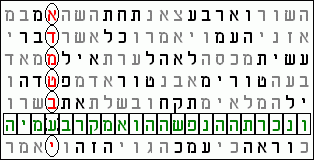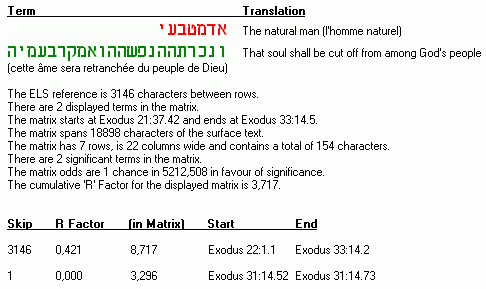
Code by Fab
The natural man.


Genesis 3:6: "And when the woman saw that the
tree was good for food, and that it was pleasant to the eyes, and
a tree to be desired to make one wise, she took of the fruit
thereof, and did eat, and gave also unto her husband with her; and
he did eat."
Rips
searched for the expression "why troubles?"
in the Torah and guess where the lowest skip showed up?
In the same passage!
In the same passage!
Paul
expounds a lot more on all that (the sinful nature, or "the flesh",
"carnal mind", "natural man"):
Romans
8:7: "Because the carnal mind is enmity against God:
for it is not subject to the law of God, neither indeed can be."
Galatians
5:19: "Now the works of the flesh are clearly revealed,
which are: immorality, uncleanness, licentiousness,
20 idolatry, sorcery, hatreds, fightings, jealousies, outbursts of anger, rivalries, divisions, heresies,
21 envying, drunkenness, wild parties, and things like these, of which I forewarn you just as I have forewarned you that those who commit such things will not inherit the Kingdom of God."
20 idolatry, sorcery, hatreds, fightings, jealousies, outbursts of anger, rivalries, divisions, heresies,
21 envying, drunkenness, wild parties, and things like these, of which I forewarn you just as I have forewarned you that those who commit such things will not inherit the Kingdom of God."
1
Corinthians 2:14: "But the natural man receives not the
things of the Spirit of God: for they are foolishness unto
him: neither can he know them, because they are spiritually discerned."
I also searched for the expressions "carnal mind", "natural man" in the Tanach, both were extendable to "carnal mind is confusion/decadence" and "enmity of the natural man".
Peace and
freedom are only possible through Christ, there is no other way:
Romans
5:1: "Therefore having been justified out of faith, we have
peace with God through our Lord Jesus Christ"
Ephesians
2:14: "For He Himself is our peace, Who made both
groups one, and loosened the barrier of the dividing wall,
15 by rendering inoperative the enmity, the religious Law of commandments contained in dogma, that in Himself He might make the two into one renewed man, making peace,
16 and might completely reconcile them in one body to God through the cross, by having killed the enmity.
17 And He came and gladly announced peace to you who were far away, and peace to those who were near"
15 by rendering inoperative the enmity, the religious Law of commandments contained in dogma, that in Himself He might make the two into one renewed man, making peace,
16 and might completely reconcile them in one body to God through the cross, by having killed the enmity.
17 And He came and gladly announced peace to you who were far away, and peace to those who were near"
Fab